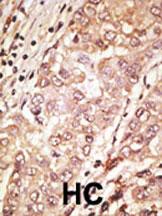CRIPTO (TDGF1) Antibody (N-term)
Purified Rabbit Polyclonal Antibody (Pab)
- SPECIFICATION
- CITATIONS
- PROTOCOLS
- BACKGROUND

Application
| WB, IHC-P, E |
|---|---|
| Primary Accession | P13385 |
| Reactivity | Human |
| Host | Rabbit |
| Clonality | Polyclonal |
| Isotype | Rabbit IgG |
| Calculated MW | 21169 Da |
| Antigen Region | 18-48 aa |
| Gene ID | 6997 |
|---|---|
| Other Names | Teratocarcinoma-derived growth factor 1, Cripto-1 growth factor, CRGF, Epidermal growth factor-like cripto protein CR1, TDGF1, CRIPTO |
| Target/Specificity | This CRIPTO (TDGF1) antibody is generated from rabbits immunized with a KLH conjugated synthetic peptide between 18-48 amino acids from the N-terminal region of human CRIPTO (TDGF1). |
| Dilution | WB~~1:1000 IHC-P~~1:50~100 E~~Use at an assay dependent concentration. |
| Format | Purified polyclonal antibody supplied in PBS with 0.09% (W/V) sodium azide. This antibody is purified through a protein A column, followed by peptide affinity purification. |
| Storage | Maintain refrigerated at 2-8°C for up to 2 weeks. For long term storage store at -20°C in small aliquots to prevent freeze-thaw cycles. |
| Precautions | CRIPTO (TDGF1) Antibody (N-term) is for research use only and not for use in diagnostic or therapeutic procedures. |
| Name | CRIPTO {ECO:0000303|PubMed:2792079, ECO:0000312|HGNC:HGNC:11701} |
|---|---|
| Function | GPI-anchored cell membrane protein involved in Nodal signaling. Cell-associated CRIPTO acts as a Nodal coreceptor in cis. Shedding of CRIPTO by TMEM8A modulates Nodal signaling by allowing soluble CRIPTO to act as a Nodal coreceptor on other cells (PubMed:27881714). Could play a role in the determination of the epiblastic cells that subsequently give rise to the mesoderm (PubMed:11909953). |
| Cellular Location | Cell membrane; Lipid-anchor, GPI-anchor. Secreted. Note=Released from the cell membrane by GPI cleavage. |
| Tissue Location | Preferentially expressed in gastric and colorectal carcinomas than in their normal counterparts. Expressed in breast and lung. |

Thousands of laboratories across the world have published research that depended on the performance of antibodies from Abcepta to advance their research. Check out links to articles that cite our products in major peer-reviewed journals, organized by research category.
info@abcepta.com, and receive a free "I Love Antibodies" mug.
Provided below are standard protocols that you may find useful for product applications.
Background
TDGF1 is expressed both in ES cells and during the early phases of embryo development, while in adults it is reactivated in a wide range of epithelial cancers. This protein could play a role in the determination of the epiblastic cells that subsequently give rise to the mesoderm. It is preferentially expressed in gastric and colorectal carcinomas compared to their normal counterparts.
References
Parisi, S., et al., J. Cell Biol. 163(2):303-314 (2003).
Gray, P.C., et al., Proc. Natl. Acad. Sci. U.S.A. 100(9):5193-5198 (2003).
Yan, Y.T., et al., Mol. Cell. Biol. 22(13):4439-4449 (2002).
de la Cruz, J.M., et al., Hum. Genet. 110(5):422-428 (2002).
Dono, R., et al., Am. J. Hum. Genet. 49(3):555-565 (1991).
If you have used an Abcepta product and would like to share how it has performed, please click on the "Submit Review" button and provide the requested information. Our staff will examine and post your review and contact you if needed.
If you have any additional inquiries please email technical services at tech@abcepta.com.













 Foundational characteristics of cancer include proliferation, angiogenesis, migration, evasion of apoptosis, and cellular immortality. Find key markers for these cellular processes and antibodies to detect them.
Foundational characteristics of cancer include proliferation, angiogenesis, migration, evasion of apoptosis, and cellular immortality. Find key markers for these cellular processes and antibodies to detect them. The SUMOplot™ Analysis Program predicts and scores sumoylation sites in your protein. SUMOylation is a post-translational modification involved in various cellular processes, such as nuclear-cytosolic transport, transcriptional regulation, apoptosis, protein stability, response to stress, and progression through the cell cycle.
The SUMOplot™ Analysis Program predicts and scores sumoylation sites in your protein. SUMOylation is a post-translational modification involved in various cellular processes, such as nuclear-cytosolic transport, transcriptional regulation, apoptosis, protein stability, response to stress, and progression through the cell cycle. The Autophagy Receptor Motif Plotter predicts and scores autophagy receptor binding sites in your protein. Identifying proteins connected to this pathway is critical to understanding the role of autophagy in physiological as well as pathological processes such as development, differentiation, neurodegenerative diseases, stress, infection, and cancer.
The Autophagy Receptor Motif Plotter predicts and scores autophagy receptor binding sites in your protein. Identifying proteins connected to this pathway is critical to understanding the role of autophagy in physiological as well as pathological processes such as development, differentiation, neurodegenerative diseases, stress, infection, and cancer.



